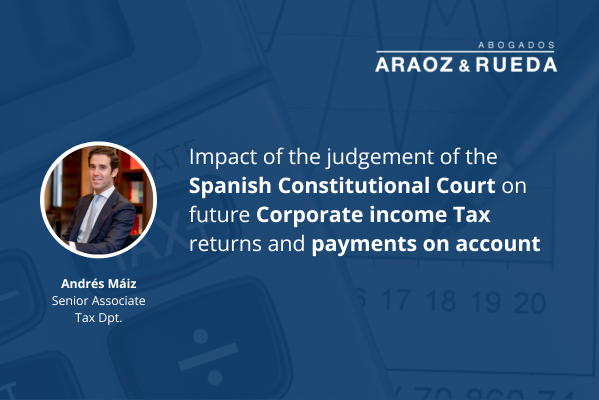The Spanish Constitutional Court (“CC“) has issued on January 18, 2024 the judgment 11/2024 in which it solves the unconstitutionality question raised in relation to article 3.1, first and second paragraphs, of Royal Decree-Law 3/2016, of December 2, adopting measures in the tax area aimed at the consolidation of public finances and other urgent measures in social matters.
The first paragraph introduced additional limits to the offset of Carry forward tax losses (“CFTLs“) and tax reliefs to avoid international double taxation that could be applied by large companies as of January 1, 2016 in their corporate income tax (“CIT”). In turn, the second paragraph established the obligation to integrate in the CIT base the impairments that had been deducted in previous years, at the rate of one fifth per year, for a period of five years from January 1, 2016.
The CC concludes that with the approval by decree-law of the questioned precepts, the essence of the duty to contribute to the support of public expenditure of Article. 31.1 of the Spanish Constitution has been affected, violating the provisions of Article 86.1 of the Spanish Constitution, and therefore they are declared unconstitutional and null and void.
However, the CC indicates in the aforementioned judgment that situations susceptible to review based on this judgment cannot be considered to be those tax obligations accrued for CIT that, at the date of the judgment, have been definitively decided by a final judgment or by a final administrative decision. Neither can those tax assessments that have not been challenged at the date of the judgment, nor those self-assessments whose rectification has not been requested at that date.
In turn, the Spanish Tax Authorities have issued a note in relation to the impact of this judgement on the inspection procedures currently open and pending liquidation in which they clarify that such procedures would not be affected by the previous limitation of effects, nor would be those initiated later.
Despite the limitation of effects introduced by the CC, those CIT taxpayers who were affected by these limitations on the amount of CFTLs that could be offset to 50% or 25% of their previous taxable income or the amount of deductions to avoid international double taxation based on their net turnover, will no longer be affected by these limitations. Likewise, it is likely that the possibility of offsetting a higher amount of CFTLs will cause a higher number of CIT payments on account corresponding to the fiscal year 2024 to be affected by the minimum payment on account obligation established by the Spanish CIT Act, which could be challenged due to potential unconstitutionality defects.





